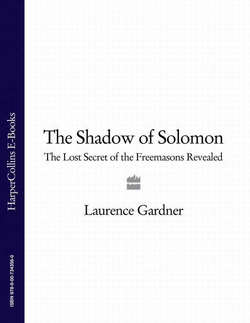Читать книгу The Shadow of Solomon: The Lost Secret of the Freemasons Revealed - Laurence Gardner - Страница 8
The Riddle of the Lost Archive
ОглавлениеFreemasonry is described by the United Grand Lodge of England as ‘a peculiar system of morality, veiled in allegory and illustrated by symbols’. It is associated with the funding of schools, hospitals and care centres. But, worthy as these activities might be, it appears that they were introduced to give meaning and purpose to a brotherhood which apparently had no access to records of the tradition which it endeavoured to emulate. When the Presbyterian mason Rev James Anderson compiled and published The Constitutions of the Free-Masons in 1723, he wrote:
Very little has come down to us that testifies the English masonic tradition before the latter 17th century. Many of the Fraternity’s records of Charles II’s and former reigns were lost in the next and at the Revolution of 1688; and many of them were too hastily burnt in our time for fear of making discoveries.
Anderson’s reference to the ‘English masonic tradition’ is important because it reflects a commonly held view that Freemasonry is English by design. In loose terms, this is fair comment since the first Grand Lodge (as against separately run independent lodges) was instituted in London in 1717. Just six years after this, Anderson commented on the fraternity’s records of a previous generation—an archive that had seemingly been lost. Were those records English, or were they perhaps Scottish, given that King Charles II Stuart (whom he mentions) was of the royal line of Scotland? The Knights Templars certainly had been prevalent in Scotland after being banished by the Pope from England and Europe in 1307, but the 12th-century origin of the Templars was a matter of French historical record before it was Scottish.
If Freemasonry evolved into England from Scotland, and prior to that from France, an interesting scenario would be presented. But it would still not explain how centuries of chronicles from before 1723 had been lost. It may be that they were not lost—merely that it suited the new style of English Freemasonry to pretend this was so. But since Freemasonry is founded on the principles of honesty and integrity, it would seem incongruous for the establishment to be constituted with a pointless falsehood from the outset.
Our task, therefore, is to search beyond Anderson’s Constitutions and the founding of the first Grand Lodge of England—to look back as far as possible, tracing the story of Freemasonry as it evolved to become the secretive, charitable institution that exists today. In this regard, our search for the lost records must begin with Anderson’s own statement that they went missing in the reign following King Charles II, and during the Revolution of 1688.
